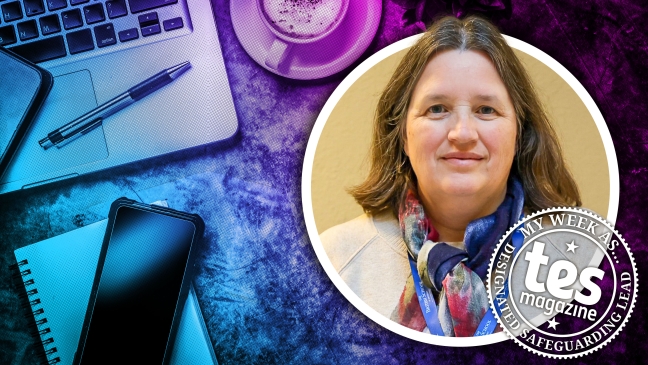
- Home
- Leadership
- Strategy
- My Week As... DSL at the British School of Amsterdam
My Week As... DSL at the British School of Amsterdam

Helen Rigelsford is the designated safeguarding lead (DSL) and a member of the leadership team at the British School of Amsterdam (BSA).
She has worked at the school for 28 years. It was founded in 1977 when three families posted to the Netherlands decided to teach their children from one family’s home; the 3-18 school now has 1,100 students.
She spoke to Tes about a typical week.
Meetings
I spend a lot of time in meetings - weekly, with each head of school, for example, as well as weekly senior-school safeguarding meetings.
I see the safeguarding teams for junior and early years as needed. I have a weekly meeting with the principal, a fortnightly one with the bursar, and attend the local area safety meeting about five times a year (attendees include police, social workers, youth workers, street-crime prevention teams and attendance officers). In school, we regularly discuss cases and hold “team-around-the-child” meetings when a concern needs a fast response.
Meeting parents and guardians is also important. In the Netherlands, concerns are kept much closer to the child and family: if the school can respond to a child’s needs and support the family effectively, we don’t need to make an official report. We may report, however, if we immediately realise that a case needs more specialised input, or if agreed actions haven’t been followed up by parents or carers.
When I began in this system it was nerve-racking - but it works well. The school stays in close contact with the family and immediate barriers aren’t put up.
There are often impromptu meetings - colleagues with a question or a worry about a pupil. Occasionally, pupils stick their heads around the door. Recently one asked, “Are you still safeguarding me?” - I loved that word being used as a verb.
Training
We ensure that anyone coming to our school has introductory child-protection and safeguarding training, including admin staff, cleaners, parent volunteers, invigilators and therapists. I’m kept busy ensuring that training (sometimes in two languages at once) is up-to-date and relevant to our school.
I also make sure pastoral and leadership staff have the required training. More information is provided via a safeguarding feature in our weekly staff bulletin, while in monthly in-person staff briefings, we always share a safeguarding snippet.
I keep up with continuing professional development and news on child protection and safeguarding through various organisations, including Cobis, The Safeguarding Alliance (experienced in working with international schools), the Safeguarding Network, the Global Safeguarding Collaborative, Augeo Academy and Veilig Thuis (which translates as “safe home”, an organisation that gives advice about dealing with children in unsafe situations).
I read related research and biographies. My next read is Unbreakable by the former tennis player Jelena Dokic, which gives insight into what children can be going through while masking to the outside world.
Administration of electronic safeguarding system
Just now, this takes longer than I’d like, but is far more effective than recording concerns on paper. We began using an online platform shortly after the pandemic started. There are advantages, in that concerns are recorded the same way by all staff and come quickly to the attention of whoever needs to see them, while providing built-in confidentiality.
Contact with outside agencies
A lot of time is spent on this, both to gain advice about a situation and to put help in place for a child or family. When you know the routes through the system, there’s a lot of support available. The difficulty for international schools is that it’s not provided automatically - we have to go looking. Being able to speak Dutch helps, as do connections with other schools and organisations such as the vice police, digital police and the Sexual Assault Center.
Sadly, since 2015, care services have been decentralised in the Netherlands and I see a real impact on funding, quality and response times. Things used to be much more predictable, as services were similar across the country. It can be time-consuming now to find the right place to refer a child to. There’s also the need for professional challenge sometimes when promised support is not forthcoming.
Improving the curriculum
At times, conversations stem from a specific safeguarding incident. For example, a year ago there was an increase in muggings of young people in parts of the city - teenagers on “fat bikes” stealing phones, designer watches, clothes and money. Our education centred on how to keep safe: walking or cycling in pairs, not having a phone in your hand, being alert to your environment and, if the worst happens, not fighting back.
We also try to pre-empt issues so that pupils (and parents) have the information to avoid negative situations to begin with - a lot of effort goes into teaching about online safety.
Self-care
Being a DSL can be emotionally challenging, but I have a supportive leadership team and pastoral colleagues. It also helps that I have Wednesdays off each week.
In recent years, we’ve introduced supervision for our deputy DSL team. Each term, we have a supervision session for each school section - where we evaluate cases and see how we can improve our practice - and individual supervision, which is available to any deputy DSL.
One thing I value greatly about the BSA pastoral teams is that we listen to each other, put forward our opinions and come to a joint decision in the child’s best interests.
Personal time
I read books and magazines, see friends and family, watch documentaries, get out into nature (I seem to need that increasingly as I get older), listen to music and sing along at the top of my voice, watch tennis and rugby, spend time with my weekend foster daughters, and have late-night conversations with my daughter - most are way above my head, as she studies astronomy and likes to start chatting after midnight.
What would I like to do more or less of?
In an ideal world, there’d be no need for my job as DSL - no one would be put into the stressful situations that create many concerns.
The next best thing would be a huge reduction in the taboo around children and families in abusive and challenging situations - then more people would have the courage to speak up when they see children in need and support could be offered in a non-judgmental and caring way. I wish more people recognised it really could happen to anyone.
Helen Rigelsford was talking to Henry Hepburn
For key school and trust leadership insights delivered every month, sign up for the Tes Leaders’ Briefing newsletter
You need a Tes subscription to read this article
Subscribe now to read this article and get other subscriber-only content:
- Unlimited access to all Tes magazine content
- Exclusive subscriber-only stories
- Award-winning email newsletters
- Unlimited access to all Tes magazine content
- Exclusive subscriber-only stories
- Award-winning email newsletters
You need a subscription to read this article
Subscribe now to read this article and get other subscriber-only content, including:
- Unlimited access to all Tes magazine content
- Exclusive subscriber-only stories
- Award-winning email newsletters
- Unlimited access to all Tes magazine content
- Exclusive subscriber-only stories
- Award-winning email newsletters
topics in this article




